|
|
|
Sort Order |
|
|
|
Items / Page
|
|
|
|
|
|
|
| Srl | Item |
| 1 |
ID:
118728
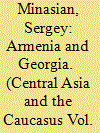

|
|
|
|
|
| Publication |
2012.
|
| Summary/Abstract |
Relations between Armenia and Georgia go back many centuries into the history of these two neighboring nations. The recent history of their relations as two post-Soviet newly independent states is only two decades old, which means that certain problems have not yet been resolved.
Both countries have to cope with political, ethnopolitical, economic, linguistic, and religious problems; the situation in both countries is further complicated by the far from simple processes of nation-building and the countries' involvement in bloody ethnopolitical conflicts in the Caucasus. This has inevitably affected the political and socioeconomic development of both Armenia and Georgia.
|
|
|
|
|
|
|
|
|
|
|
|
|
|
|
|
| 2 |
ID:
118734
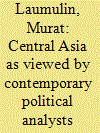

|
|
|
|
|
| Publication |
2012.
|
| Summary/Abstract |
Not so long ago it seemed that by the end of the 2000s interest in Central Asia from abroad had exhausted itself and there was nothing new to add to what had already been written about the region. The West, which paid the greatest attention to the region due to the presence of America and NATO in Afghanistan, appeared to have lost its geopolitical interest in Central Asia. Washington unofficially recognized Russia's "legitimate" interests in the region as part of the reset policy, probably in the hope that Moscow's influence would be trimmed by China's increasing presence in the same region.
|
|
|
|
|
|
|
|
|
|
|
|
|
|
|
|
| 3 |
ID:
118735
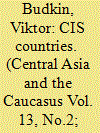

|
|
|
|
|
| Publication |
2012.
|
| Summary/Abstract |
December 1991 marked the beginning of a grandiose experiment whose purpose was to establish a whole group of independent states in the territory of a world giant known as the U.S.S.R., which occupied one-sixth of the Earth. Their establishment was based on the negation of the previous Soviet model providing for the domination of one party, which had imposed a no-choice ideology on the society, and for the administrative command system of politics and economics.
|
|
|
|
|
|
|
|
|
|
|
|
|
|
|
|
| 4 |
ID:
118730
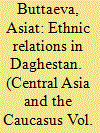

|
|
|
|
|
| Publication |
2012.
|
| Summary/Abstract |
In recent years, problems relating to the state and development dynamics of ethnic relations, which have an effect on the sociopolitical and moral-psychological atmosphere in Russia, are becoming an increasingly frequent target of study. Resolving sociopolitical problems is particularly important in the context of the current instability in the Northern Caucasus.
|
|
|
|
|
|
|
|
|
|
|
|
|
|
|
|
| 5 |
ID:
118732
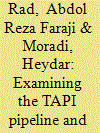

|
|
|
|
|
| Publication |
2012.
|
| Summary/Abstract |
Before 1991, the states of Central Asia were marginal backwaters, republics of the Soviet Union that played neither a major role in the Cold War relations between the U.S.S.R. and the United States, nor in the Soviet Union's relations with the principal regional powers of Turkey, Iran, and China. But in the 1990s, the dissolution of the Soviet Union coincided with rediscovery of the energy resources of the Caspian Sea, attracting a wide range of international oil companies, including American majors, to the region. Eventually, the Caspian Basin became a point of tension in U.S.-Russian relations. In addition, Central Asia emerged as a zone of conflict between the regional and cross-regional powers. The events of 11 September, 2001 and the terrorist groups operating in Afghanistan brought Central Asia to the forefront of U.S. attention. The growing importance of natural gas imports to today's economies is compelling the world community to think anew about energy security.
|
|
|
|
|
|
|
|
|
|
|
|
|
|
|
|
| 6 |
ID:
118737


|
|
|
|
|
| Publication |
2012.
|
| Summary/Abstract |
The national economy of each of the Central Asian countries aims to create conditions that ensure a satisfactory standard of living for its population, to the extent available resources allow, based on sustainable development. According to its landmark definition, sustainable development is "development that meets the needs of the present without compromising the ability of future generations to meet their own needs (italics mine.-M.H.)." In other words, future generations should not have to pay for the counterproductive economic and other activity of the present generation. Here it is worth noting that external debt burden is among the factors that have a detrimental impact on such vitally important state budget-financed spheres as public health, education, social security, etc.
|
|
|
|
|
|
|
|
|
|
|
|
|
|
|
|
| 7 |
ID:
118727
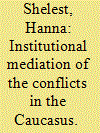

|
|
|
|
|
| Publication |
2012.
|
| Summary/Abstract |
The peaceful settlement of international conflicts has gained strong support and recognition as one of the fundamental principles of international relations. Different means and methods of mediation have been used by practitioners over the years. As a form of conflict management and peaceful settlement, mediation is very much in line with contemporary international relations. In the present-day interconnected multistate system, which includes a lot of broken agreements and unstructured conflicts, prevention or taking only one side may lead to a future struggle, or states may act only in their own interests and not always agree to enter negotiations. In such situations, mediation may be the only viable option the sides are willing to accept.
|
|
|
|
|
|
|
|
|
|
|
|
|
|
|
|
| 8 |
ID:
118726
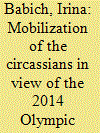

|
|
|
|
|
| Publication |
2012.
|
| Summary/Abstract |
When in Europe, I am often asked about my occupation at home. My answer, "I study the ethnography of the peoples of the Northern Caucasus," baffles people; most of them do not know where to look for the Caucasus on the map, however everyone recognizes the word "Chechens," an echo of the Chechen wars of the 1990s.
|
|
|
|
|
|
|
|
|
|
|
|
|
|
|
|
| 9 |
ID:
118729
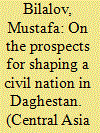

|
|
|
|
|
| Publication |
2012.
|
| Summary/Abstract |
Russia's integrity depends on ensuring civil identity as a priority factor in the development of society and the individual. Civil identity is fully realized in a civil nation that gradually takes shape within a particular society. The crisis of multiculturalism in the West triggered by the crisis of the European civilization and culture calls for a revision of certain ideas and theories associated with civil identity.
|
|
|
|
|
|
|
|
|
|
|
|
|
|
|
|
| 10 |
ID:
118725
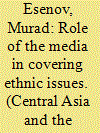

|
|
|
|
|
| Publication |
2012.
|
| Summary/Abstract |
Ethnic conflicts are one of the most problematical and sensitive issues known to the world today. Since World War II, for example, more than 100 armed conflicts have broken out in different parts of the world, most of which are ethnic in nature. These conflicts pose a threat to state security and territorial integrity and, in their extreme form, are accompanied by violence, bloodshed, mass violations of human rights, huge numbers of refugees, significant material losses, and so on.
|
|
|
|
|
|
|
|
|
|
|
|
|
|
|
|
| 11 |
ID:
118736


|
|
|
|
|
| Publication |
2012.
|
| Summary/Abstract |
In recent years, sustainable economic development has been an increasingly higher priority for all, both well and less developed, states. The global economic crisis that broke out in 2008 showed that the steadily high growth rates demonstrated by many countries throughout the pre-crisis years, even giving some of them the honorary titles like, for instance, "Celtic tiger," in actual fact do not always testify to sustainable development. There are economic and social "diseases" that can disrupt, or at least slow down, growth no matter how sustainable it previously seemed. Whereby these diseases can be both internal, that is, determined by trends governing the country's development, and external, that is, brought in from the outside world, making sustainable economic development not at all what it seemed to be before the crisis.
|
|
|
|
|
|
|
|
|
|
|
|
|
|
|
|
| 12 |
ID:
118733


|
|
|
|
|
| Publication |
2012.
|
| Summary/Abstract |
Not so long ago it seemed that by the end of the 2000s interest in Central Asia from abroad had exhausted itself and there was nothing new to add to what had already been written about the region. The West, which paid the greatest attention to the region due to the presence of America and NATO in Afghanistan, appeared to have lost its geopolitical interest in Central Asia. Washington unofficially recognized Russia's "legitimate" interests in the region as part of the reset policy, probably in the hope that Moscow's influence would be trimmed by China's increasing presence in the same region.
|
|
|
|
|
|
|
|
|
|
|
|
|
|
|
|
| 13 |
ID:
118731


|
|
|
|
|
| Publication |
2012.
|
| Summary/Abstract |
Efforts are currently being stepped up to create a Trans-Afghan transport corridor (TATC), motivated primarily by its vast transit capabilities and the role it can play in developing economic relations in the Central Asia region. Furthermore, it is important to note that building a transport infrastructure in Afghanistan capable of invigorating integration with neighboring states is not only vital for developing the country's economy, but also for ensuring its domestic political stability.
|
|
|
|
|
|
|
|
|
|
|
|
|
|
|
|
|
|
|
|
|